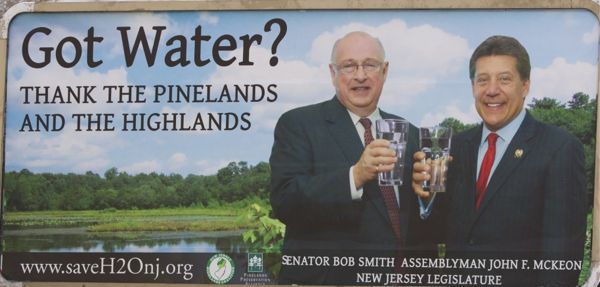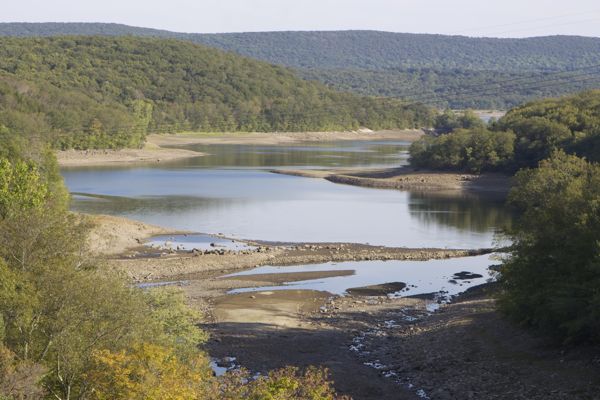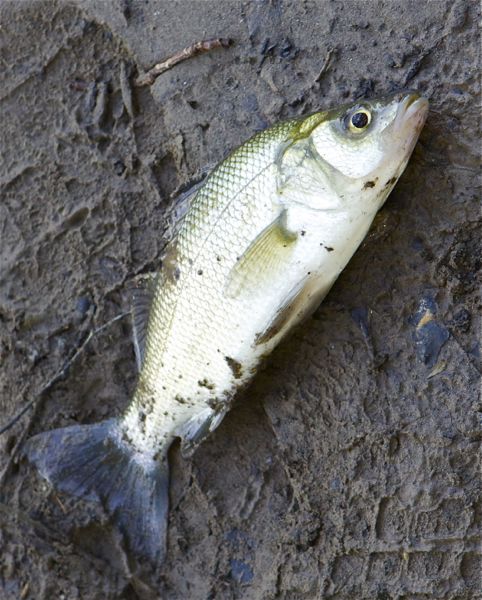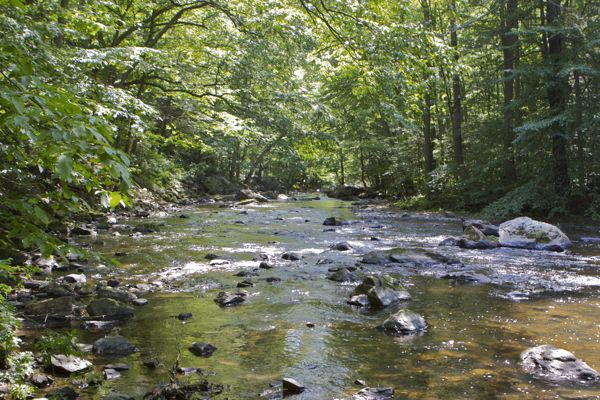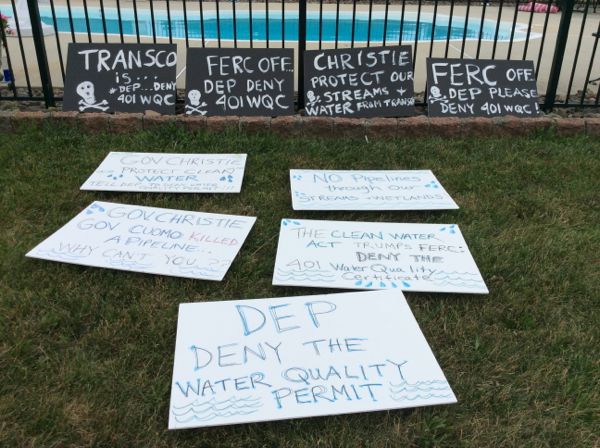“Extremely Dry” Drought Conditions Contradict “Normal” Drought Status – Scientists Warn “Trouble Ahead”
DEP Dragging Their Feet In Warning Public About Drought
DEP Scientists Take Steps To Warn Public Despite DEP Managers and Politics
Are Gov. Christie’s Political Ambitions Blocking DEP From Declaring A Drought Watch?
[Updates below]
Something extraordinary and perhaps unprecedented just happened – certainly something I’ve never seen before.
There has been a quiet rebellion by the scientists at the DEP –
The scientists have taken steps to quietly warn the public about drought, without declaring a formal drought watch or warning and without the required approval of the DEP Commissioner.
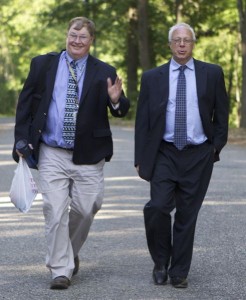
NJ State Geologist Jeff Hoffman (L) is on a tight leash of Christie DEP political appointee Ray Cantor (6/1/16)
DEP water resource professions are basically saying their boss is not paying attention or is incompetent or political factors are blocking them from doing their job.
We’ve seen that in how Governor Christie killed the legally mandated update to the 1996 Water Supply Plan.
But I’ve never seen this before – highlighted in a bright yellow background – take a LOOK at the DEP drought indicators website:
Comment on the Drinking Water Supply Indicators:
Scant rainfall, particularly across New Jersey’s northern tier, is degrading the drinking water supply indicators tracked by the NJDEP. Stream flows are ranked “extremely” dry, the lowest category, in the four most northerly regions, while shallow ground water levels are considered “severely” dry in all but the Coastal South region. Reservoir storage, however, is only marginally below the long-term average, and this helps mitigate the effects of the dry weather. While there are no adverse impacts on drinking water supplies at this time, the constrained indicators point to potential trouble ahead in terms of a developing water supply drought if dry conditions persist. Accordingly, DEP water professionals are closely monitoring conditions to plan for and recommend administrative actions, should they become necessary.
Perhaps the DEP scientists are concerned that key drought indicators contradict the declared “water supply status”.
Some key drought indicators like precipitation and stream flow and groundwater levels are “Severely dry” and “Extremely dry” – the worst conditions – yet the “Water Supply Status” is listed as “Normal”.
DEP Commissioner’s approval is required to declare a drought Watch, Warning or Emergency – the steps DEP scientists refer to as “administrative actions”.
DEP drought warnings are politically sensitive and can be controversial. Typically, as a matter of practice, the declaration of a drought Watch by the DEP Commissioner requires at least consultation or in some cases approval by the Governor’s Office, depending on the independence of the Commissioner and the management style of the Gov. In this case, a weak and inexperienced Commissioner reports to a powerful micro-managing Governor, so I am certain the Gov. must sign off before DEP can act.
The science is clearly not reflected by the DEP policy.
(Note: the DEP scientists’ warning was prior to last night’s storm – which is just another example of NJ’s vulnerability and pattern of “Lurching From Drought to Flood“).
I guess it would be politically inconvenient for DEP to declare a “Drought Watch” while environmentalists have launched a campaign and are BLASTING DEP for rolling back water resource protections in the Highlands, which supply drinking water for about 5 million people.
Of course, it is possible that the Governor doesn’t want drought declared in his state at a sensitive time he is seeking a VP or Cabinet slot in the runup to the Republican National Convention on July 18.
Regardless of the motivations, once again, the science contradicts the policy of the Christie administration’s DEP.
Is this the “trouble ahead” and where we’re heading? (and with low stream and river flows come higher concentrations of pollutants, which limit the use of river water for pumping to reservoirs and increases health risks from river driving water intakes.)
[Update #1 – 7/10/16 – This post closed with a photo of a dead fish for a reason: to show that aquatic life depends on stream and river flows. Low flows, combined with warm temperatures, create conditions that deplete oxygen and kill.
DEP is ignoring their responsibility to protect ecological uses of our waters – a responsibility established under both the NJ Water Supply Management Act and the Clean Water Act.
DEP is considering ONLY the reservoir levels and ONLY the drinking water uses of water associated with drought conditions. This DEP statement PROVES that:
Reservoir storage, however, is only marginally below the long-term average, and this helps mitigate the effects of the dry weather.
To make a statement like this show that abdication. Reservoir storage only mitigates the effects of dry weather on the people drinking reservoir water and the aquatic life that uses the reservoir. ~~~ end]
[Update #2 – 7/18/16 – NJ Spotlight follows with the story – ignores of downplays the policy, planning and regulatory issues and is a LOT more generous to DEP than I, as usual:
Almost 7 years into the CHristie DEP debacle and still we can’t get critical reporting. WTF! – end


